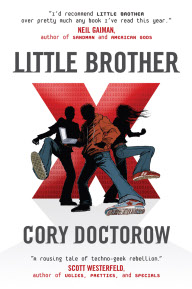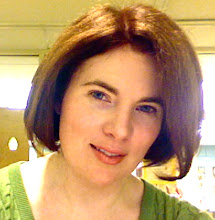Review: The Most Dangerous Book in the Library - Little Brother by Cory Doctorow
It's only appropriate that with Banned Books Week having begun today, that I should be blogging about "dangerous" books. Banned Books Week, which always happens in late September, is a joint effort of the American Library Association and other concerned organizations, which come together to heighten public awareness of the regular efforts of some individuals to take books they don't like off the shelf of libraries and bookstores everywhere. Young adult and children's librarians get particularly hopped up about this as most objections, which when formally filed are known as challenges, are aimed at the removal of books marketed to young people. I think the majority of librarians, like myself, feel that parents are welcome to choose materials that reflect their families beliefs and values and restrict what their children read (even though we cringe a little when they do it), but that no person has the right to restrict what someone else's child can read.We should all be thanking our lucky stars that more book banning parents haven't read Little Brother by Cory Doctorow, because they would undoubtedly have given birth to several litters of kittens by page 40. The novel centers on its hip protagonist, Marcus, who cuts school and circumvents the electronic barriers in his way in order to play games and engage in playful hacks with his equally savvy friends. But one afternoon as he gallivants around San Francisco with his buddies, disaster hits in the form of a terrorist explosion. In the ensuing panic Marcus and his friends are picked up by Homeland Security and taken to an undisclosed location to be questioned. The kids are treated as dangerous criminals with three of the four released under the threat that they will be watched and are not to tell anyone what transpired.
Each of kids, mourning the loss of their missing friend who they assume has died, deals with the event differently, but Marcus is absolutely enraged at being treated this way and decides to highlight to the world exactly how Homeland Security isn't making anyone safer by the measures imposed after the attack in San Francisco. Hacking his giveaway Xbox, Marcus creates Xnet, a secure community of savvy technology users who are happy to disseminate and share the information he publishes about how to undermine and get around the government's tracking devices and information gathering programs.
This book totally kicked my butt. The characters are well-drawn and the technology discussed in the most knowledgeable way (if we don't have it already, it's in the works, like ParanoidLinux). The novel is a manifesto to what can happen when a government abuses the freedom of its citizens, hence the title which makes a direct reference to the "Big Brother" in George Orwell's 1984. There is a ton of technology details however so that even avid readers of technology-centered nonfiction would find enough to keep them thinking, whether its Bayesian probability to explain arrest methodology or RFID hacking.
An unexpected but very welcome bonus to this excellent novel is the fountain of informative afterwords that follow the end of the text. Bruce Schneier, a security systems expert, and Andrew Huang, the guy who literally wrote the book on Hacking Your Xbox, both put in their two cents about the technology in the book and encourage readers to experiment with technology and challenge themselves. If you didn't know any better, you'd swear the book was a brilliant plant for engineering and computer science programs all over the country. Doctorow offers in his addendum a diverse collection of books, websites, and white papers that bring together many of themes in his book, including copyright and digital rights management issues. I was so happy to see FreeCulture.org and Creative Commons since those are both resources we push hard in our information literacy curriculum. Big surprise Doctorow is always being featured at library conventions. I used this section to some serious collection development work in my 000s and 600s. Thanks, Cory!
I guess I'm not that worried about the book banners. I think the majority of adults would shut the book when Marcus starts in about LARPing and lapses into techspeak while a bunch of other people would totally agree with his message. After all, Doctorow's message is the same as this year's Banned Books Week - Think for Yourself and Let Others Do the Same. I'm going to be checking out his other science fiction books. I think I found myself a new favorite author.



































2 comments
Write commentsI hate that I haven't read this one yet! Soon, soon!
ReplyIt has taken me to three quarters of the way through the book to finally get captured by it. I understand its relevance to our modern society. But the detailed technology passages make me zone out.
ReplyI was completely offended by the unnecessary language, sexual content, and do's and don'ts of the drug world. These passages were a distraction from the plot and made me want to burn the book.
Our high school required that ALL students read this book. Naturally I picked up the book and read it, as well, to find out what the public school was requiring of my child. I simply could not believe that my son was required to read a book with such explicit sexual content and a "how to" for parties, illegal drinking and drugs. Unbelievable! This is not information that teens need to read. They either already know it and don't need to be encouraged by it, or they are yet innocent and have the right to remain that way without a public school assignment taking that away from them.
This is a book that should be read by CHOICE not by force. So much of what the author wanted to convey is lost on me in these inappropriate, unnecessary scenes. My husband is an English teacher, and he was mortified that the school required our son to read these ridiculously inappropriate and very unnecessary parts of the book.